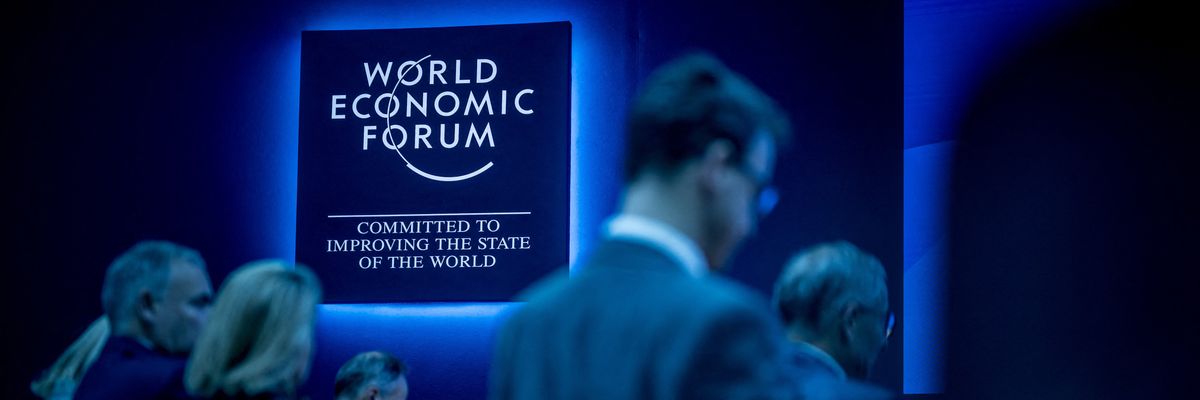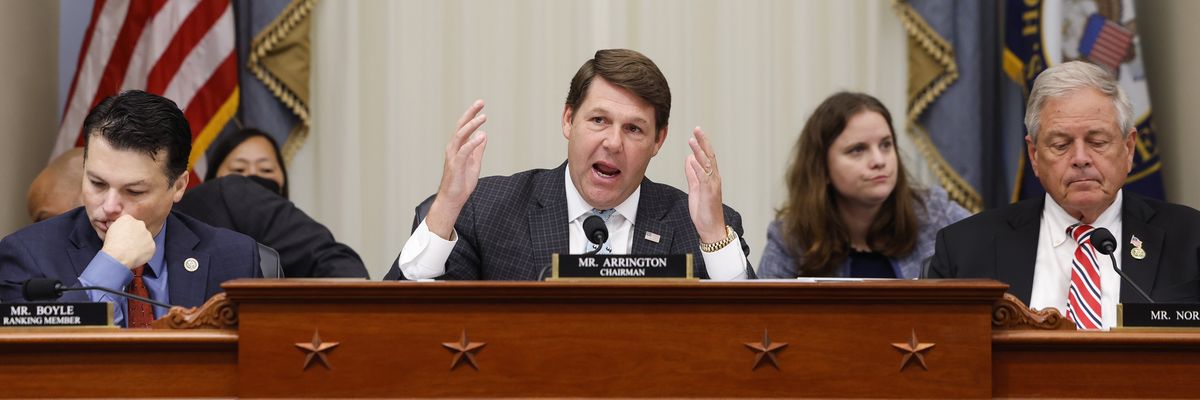Davos free-trade champions fret over war, climate
By AFP
January 19, 2024

Trade tensions took centre stage on the final day of the World Economic Forum - Copyright AFP Punit PARANJPE
Sophie ESTIENNE
After Covid and the war in Ukraine, free-trade boosters in Davos fretted over a new bout of turmoil in global supply chains due to rising geopolitical frictions.
The Israel-Hamas conflict, Yemeni rebel attacking ships in the Red Sea and tensions over Taiwan weighed on political and business elites at the five-day meeting of the World Economic Forum, which wrapped up Friday.
“There are geopolitical dynamics that are on our minds with respect to obviously the potential disruption of supply chains,” Francesco Ceccato, CEO of Barclays Europe, told AFP on the sidelines of the WEF.
“We thought we had normalised those after Covid. Clearly, that’s a little bit more precarious after … what is happening every day in the Red Sea,” he said.
Before Hamas’s attack on Israel in October, the World Trade Organization had forecast global trade growth of 3.3 percent, an improvement from 0.8 percent in 2023.
But WTO chief Ngozi Okonjo-Iweala told the forum this week that she was now “less optimistic” about world trade in 2024 due to “worsening geopolitical tensions”.
She added, however, that it would be “much better than what we saw in 2023. Unless a major war breaks out, then all bets are off.”
– Disruptions for ‘few months’ –
The Red Sea route carries about 12 percent of global maritime trade, but the attacks have prompted many companies to take a massive and costly detour around the southern tip of Africa.
Iran-backed Huthi rebels in Yemen say they are targetting Israel-linked ships in protest over the war in Gaza.
US and UK military forces have launched a series of strikes against rebel sites in Yemen.
The Huthis have “changed global trade and global shipping costs,” said Karen Harris, an economist at the consulting firm Bain & Co.
Vincent Clerc, the CEO of Danish shipping giant Maersk, said the the conflict will probably disrupt supply chains “for a few months at least. Hopefully less, but it could be also longer because it’s so unpredictable”.
Automakers Tesla and Volvo were forced to temporarily suspend some production in Europe due to a shortage of parts.
Qatar’s prime minister, Sheikh Mohammed bin Abdulrahman Al Thani, told the Davos conference that shipments of liquefied natural gas “will be affected” by the Red Sea tensions.
– Taiwan tensions –
There are concerns along other major trade routes.
Taiwan’s presidential election last weekend renewed US-China tensions over the democratic island, which China considers a part of its territory that must be brought back under its control, by force if necessary.
Speaking in Davos, US Secretary of State Antony Blinken recalled that a huge amount of commerce flows through the Taiwan Strait.
“If that were to be disrupted, it would affect the entire planet. And it’s about the last thing we need, especially coming back from Covid,” Blinken said.
Taiwan itself is a major producer of semiconductors, the microchips that are vital for a range of products from smartphones to cars.
“Any disruption in the flow of that product is going to be, again, a watch item or a concern,” Ceccato said.
– Green an tech trade spats –
Microchips are already at the heart of a trade spat between Washington and Beijing as the United States has tightened export curbs on the technology over national security concerns.
China is also squabbling with the European Union over the bloc’s probe into Chinese electric car subsidies.
Chinese Premier Li Qiang took the podium on Wednesday to slam what he called “discriminatory” trade measures on green and tech trade.
Europe is also concerned about the huge subsidies for clean technologies in the United States under the Inflation Reduction Act.
But German Finance Minister Christian Lindner warned the EU against following in the Americans’ footsteps.
“We have to avoid a subsidy race,” Lindner told Friday’s panel.
– Panama drought –
On top of geopolitical tensions, climate change has also played tricks on global trade.
A drought and water shortages linked to the El Nino weather phenomenon reduced ship traffic through the Panama Canal.
“We have more sources of disruptions,” said Tobias Meyer, CEO of German logistics group DHL.
“It’s more likely that two, three, four of these events somehow accumulate. And that leads then in the system of transport to certain bottlenecks,” he said.
Harris said each disruption “simply reinforces the return on investment for near-shoring, re-shoring” — the act of bringing production home or closer instead of relying on factories across the world.
By AFP
January 19, 2024

Trade tensions took centre stage on the final day of the World Economic Forum - Copyright AFP Punit PARANJPE
Sophie ESTIENNE
After Covid and the war in Ukraine, free-trade boosters in Davos fretted over a new bout of turmoil in global supply chains due to rising geopolitical frictions.
The Israel-Hamas conflict, Yemeni rebel attacking ships in the Red Sea and tensions over Taiwan weighed on political and business elites at the five-day meeting of the World Economic Forum, which wrapped up Friday.
“There are geopolitical dynamics that are on our minds with respect to obviously the potential disruption of supply chains,” Francesco Ceccato, CEO of Barclays Europe, told AFP on the sidelines of the WEF.
“We thought we had normalised those after Covid. Clearly, that’s a little bit more precarious after … what is happening every day in the Red Sea,” he said.
Before Hamas’s attack on Israel in October, the World Trade Organization had forecast global trade growth of 3.3 percent, an improvement from 0.8 percent in 2023.
But WTO chief Ngozi Okonjo-Iweala told the forum this week that she was now “less optimistic” about world trade in 2024 due to “worsening geopolitical tensions”.
She added, however, that it would be “much better than what we saw in 2023. Unless a major war breaks out, then all bets are off.”
– Disruptions for ‘few months’ –
The Red Sea route carries about 12 percent of global maritime trade, but the attacks have prompted many companies to take a massive and costly detour around the southern tip of Africa.
Iran-backed Huthi rebels in Yemen say they are targetting Israel-linked ships in protest over the war in Gaza.
US and UK military forces have launched a series of strikes against rebel sites in Yemen.
The Huthis have “changed global trade and global shipping costs,” said Karen Harris, an economist at the consulting firm Bain & Co.
Vincent Clerc, the CEO of Danish shipping giant Maersk, said the the conflict will probably disrupt supply chains “for a few months at least. Hopefully less, but it could be also longer because it’s so unpredictable”.
Automakers Tesla and Volvo were forced to temporarily suspend some production in Europe due to a shortage of parts.
Qatar’s prime minister, Sheikh Mohammed bin Abdulrahman Al Thani, told the Davos conference that shipments of liquefied natural gas “will be affected” by the Red Sea tensions.
– Taiwan tensions –
There are concerns along other major trade routes.
Taiwan’s presidential election last weekend renewed US-China tensions over the democratic island, which China considers a part of its territory that must be brought back under its control, by force if necessary.
Speaking in Davos, US Secretary of State Antony Blinken recalled that a huge amount of commerce flows through the Taiwan Strait.
“If that were to be disrupted, it would affect the entire planet. And it’s about the last thing we need, especially coming back from Covid,” Blinken said.
Taiwan itself is a major producer of semiconductors, the microchips that are vital for a range of products from smartphones to cars.
“Any disruption in the flow of that product is going to be, again, a watch item or a concern,” Ceccato said.
– Green an tech trade spats –
Microchips are already at the heart of a trade spat between Washington and Beijing as the United States has tightened export curbs on the technology over national security concerns.
China is also squabbling with the European Union over the bloc’s probe into Chinese electric car subsidies.
Chinese Premier Li Qiang took the podium on Wednesday to slam what he called “discriminatory” trade measures on green and tech trade.
Europe is also concerned about the huge subsidies for clean technologies in the United States under the Inflation Reduction Act.
But German Finance Minister Christian Lindner warned the EU against following in the Americans’ footsteps.
“We have to avoid a subsidy race,” Lindner told Friday’s panel.
– Panama drought –
On top of geopolitical tensions, climate change has also played tricks on global trade.
A drought and water shortages linked to the El Nino weather phenomenon reduced ship traffic through the Panama Canal.
“We have more sources of disruptions,” said Tobias Meyer, CEO of German logistics group DHL.
“It’s more likely that two, three, four of these events somehow accumulate. And that leads then in the system of transport to certain bottlenecks,” he said.
Harris said each disruption “simply reinforces the return on investment for near-shoring, re-shoring” — the act of bringing production home or closer instead of relying on factories across the world.
"Even millionaires and billionaires like me are saying it's time," said Abigail Disney. "The elites gathering in Davos must take this crisis seriously."

Participants wait for a session at the World Economic Forum annual meeting in Davos, Switzerland on January 16, 2024.
(Photo: Fabrice Coffrini/AFP via Getty Images)
JAKE JOHNSON
COMMON DREAMS
Jan 17, 2024
Survey results released Tuesday as corporate CEOs, top government officials, and other global elites gathered in Davos, Switzerland show that nearly three-quarters of millionaires in G20 countries support higher taxes on extreme wealth, which they view as an increasingly dire threat to democracy.
The poll was conducted by the London-based firm Survation on behalf of the Patriotic Millionaires, an advocacy group that campaigns for a more progressive tax system. The survey, which polled over 2,300 millionaires in G20 nations, found that 74% "support higher taxes on wealth to help address the cost-of-living crisis and improve public services."
More than 70% of the respondents said they believe wealth "helps buy political influence" and a majority see extreme concentrations of wealth at the very top as corrosive to democracy. According to an Oxfam analysis released earlier this week, the world's billionaires have gotten $3.3 trillion richer since 2020 as 5 billion people across the globe have lost ground, struggling to get by as wages fail to keep up with inflation.
"We, the very richest, are sick and tired of inaction, so it's hardly surprising that working people, at the sharp end of our rigged economies, have lost all patience," said Guy Singh-Watson, a British entrepreneur and member of Patriotic Millionaires U.K.

The poll was released as 260 millionaires and billionaires signed a letter imploring the dozens of world leaders at the World Economic Forum in Davos to raise taxes on rich people like them, warning that a continued failure to "address the dramatic rise of income inequality" would be "catastrophic for society."
"Every moment of delay entrenches the dangerous economic status quo, threatens our democratic norms, and passes the buck to our children and grandchildren. Not only do we want to be taxed more but we believe we must be taxed more," the letter reads. "The true measure of a society can be found, not just in how it treats its most vulnerable, but in what it asks of its wealthiest members. Our future is one of tax pride, or economic shame. That's the choice."
"There is a clear social, economic, ecological, intergenerational, and democratic need to address extreme economic inequality."
Abigail Disney, an American documentary filmmaker and letter signatory, said in a statement that "throughout history, pitchforks were the inevitable consequence of extreme discontent, but today, the masses are turning to populism, which is on the rise throughout the world."
Jan 17, 2024
Survey results released Tuesday as corporate CEOs, top government officials, and other global elites gathered in Davos, Switzerland show that nearly three-quarters of millionaires in G20 countries support higher taxes on extreme wealth, which they view as an increasingly dire threat to democracy.
The poll was conducted by the London-based firm Survation on behalf of the Patriotic Millionaires, an advocacy group that campaigns for a more progressive tax system. The survey, which polled over 2,300 millionaires in G20 nations, found that 74% "support higher taxes on wealth to help address the cost-of-living crisis and improve public services."
More than 70% of the respondents said they believe wealth "helps buy political influence" and a majority see extreme concentrations of wealth at the very top as corrosive to democracy. According to an Oxfam analysis released earlier this week, the world's billionaires have gotten $3.3 trillion richer since 2020 as 5 billion people across the globe have lost ground, struggling to get by as wages fail to keep up with inflation.
"We, the very richest, are sick and tired of inaction, so it's hardly surprising that working people, at the sharp end of our rigged economies, have lost all patience," said Guy Singh-Watson, a British entrepreneur and member of Patriotic Millionaires U.K.

The poll was released as 260 millionaires and billionaires signed a letter imploring the dozens of world leaders at the World Economic Forum in Davos to raise taxes on rich people like them, warning that a continued failure to "address the dramatic rise of income inequality" would be "catastrophic for society."
"Every moment of delay entrenches the dangerous economic status quo, threatens our democratic norms, and passes the buck to our children and grandchildren. Not only do we want to be taxed more but we believe we must be taxed more," the letter reads. "The true measure of a society can be found, not just in how it treats its most vulnerable, but in what it asks of its wealthiest members. Our future is one of tax pride, or economic shame. That's the choice."
"There is a clear social, economic, ecological, intergenerational, and democratic need to address extreme economic inequality."
Abigail Disney, an American documentary filmmaker and letter signatory, said in a statement that "throughout history, pitchforks were the inevitable consequence of extreme discontent, but today, the masses are turning to populism, which is on the rise throughout the world."
"We already know the solution to protect our institutions and stabilize our country: it's taxing extreme wealth," said Disney. "What we lack is the political fortitude to do it. Even millionaires and billionaires like me are saying it's time. The elites gathering in Davos must take this crisis seriously."
A report published Tuesday by the Patriotic Millionaires and allied organizations argues that "the extreme economic conditions of our age are at the heart of the world's overlapping and compounding crises," pointing to the outsized carbon footprints of the ultrawealthy and the ongoing acceleration of inequality.
The report notes that top income tax rates have fallen globally in recent decades, dropping from 58% in 1980 to 42% in recent years across Organization for Economic Cooperation and Development (OECD) countries.
"There is a clear social, economic, ecological, intergenerational, and democratic need to address extreme economic inequality," the report says. "And yet political leaders have failed to take action on the simplest of solutions: raising taxes on the ultra-rich. This is a political choice."
A report published Tuesday by the Patriotic Millionaires and allied organizations argues that "the extreme economic conditions of our age are at the heart of the world's overlapping and compounding crises," pointing to the outsized carbon footprints of the ultrawealthy and the ongoing acceleration of inequality.
The report notes that top income tax rates have fallen globally in recent decades, dropping from 58% in 1980 to 42% in recent years across Organization for Economic Cooperation and Development (OECD) countries.
"There is a clear social, economic, ecological, intergenerational, and democratic need to address extreme economic inequality," the report says. "And yet political leaders have failed to take action on the simplest of solutions: raising taxes on the ultra-rich. This is a political choice."















